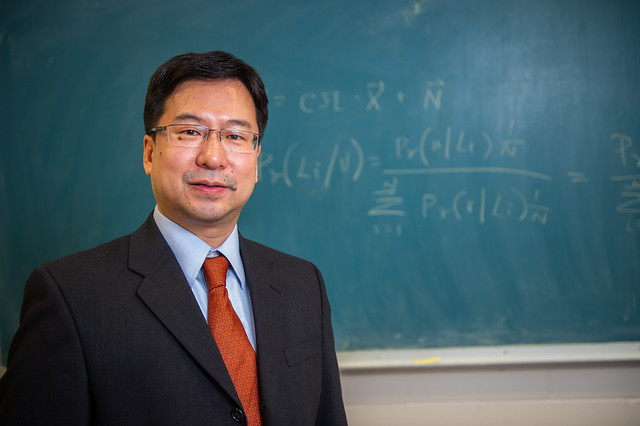Wireless engineering professor earns SEC’s Faculty Achievement Award
Article body
Auburn University professor and internationally recognized expert in wireless networking and multimedia communications Shiwen Mao has been named the recipient of the Southeastern Conference’s 2023 Faculty Achievement Award for Auburn, announced today by the SEC.
Mao, the Earle C. Williams Eminent Scholar Chair in the Samuel Ginn College of Engineering’s Department of Electrical and Computer Engineering, will receive a $5,000 honorarium from the conference and will serve as Auburn’s nominee for the SEC Professor of the Year among the Faculty Achievement Award winners from each SEC university.
“Dr. Mao is a remarkable scholar whose contributions to student learning and exemplary record of research and scholarship personify what I believe the SEC Faculty Achievement Award signifies,” said Auburn President Christopher B. Roberts.
The SEC Faculty Achievement Awards, created to recognize faculty accomplishments, scholarly contributions and discoveries, were established by SEC presidents and chancellors and are administered by the SEC provosts. The awards were first presented in 2012.
Mao is the fourth faculty member from the Samuel Ginn College of Engineering to receive this award, joining Roberts, who previously served as dean of engineering and chair of the Department of Chemical Engineering, along with Pradeep Lall, the John and Anne McFarlane Distinguished Professor of Mechanical Engineering, and Bruce Tatarchuk, the Charles E. Gavin III Professor of Chemical Engineering.
Each recipient of the SEC Faculty Achievement Award must be a full professor at an SEC university, have a performance history of extraordinary teaching and a record of scholarship that is recognized nationally or internationally.
“I am greatly humbled and honored to receive this prestigious award,” said Mao. “It means a lot to me, as it acknowledges the hard work put in by my students and collaborators and highlights the generous support from the department, the college and our alumni.”
Mao earned a bachelor’s and master’s degree in electronic engineering and a bachelor’s degree in business management from Tsinghua University in his native China. He also received a master’s degree in systems engineering and a doctorate in electrical and computer engineering from NYU’s Tandon School of Engineering.
He was a postdoctoral research associate and a research scientist at Virginia Tech University before joining the faculty at Auburn’s Department of Electrical and Computer Engineering in 2006.
Mao considers himself a researcher, scholar, educator, mentor and facilitator of innovation. His efforts have made both Auburn and the field of wireless engineering stronger and impacted many lives.
Mao is among the first researchers to work on developing the key technologies for 5G wireless technology and beyond. His project on millimeter wave communications — a key innovation in 5G — has been highlighted as one of the few National Science Foundation-funded projects enabling today’s 5G networks.
He was also among the first to work on new generations of Wi-Fi technologies and to apply machine learning to address wireless engineering problems.
Mao’s portfolio of extramural funding is robust, including more than $11 million from the most competitive sources. He has received the prestigious National Science Foundation, or NSF, CAREER Award — the first in Auburn’s electrical and computer engineering department — and he most recently received the prestigious NSF CNS Core Medium Grant and the NSF RINGS grant to further advance 5G wireless systems.
A respected faculty member and mentor, Mao is the current chair of Auburn’s wireless program and has been director of the Wireless Engineering Research and Education Center, or WEREC, since 2015. He is actively engaged with the college’s outreach and recruiting efforts, even visiting high schools to educate prospective students and parents about opportunities in wireless engineering.
He also has recruited junior faculty members to the department and mentored them on research, teaching and service. Two of these recruits have recently earned NSF CAREER Awards.
Mao consistently integrates his research and discovery into his courses. His textbook “TCP/IP Essentials: A Lab-based Approach” has been adopted at 23 universities in the United States and abroad, and he has contracted with Cambridge University Press and CRC Press to author two additional textbooks on communications networks.
Mao’s scholarly record includes an impressive number of publications and citations, including four dissertations and theses, eight authored books, 18 book chapters, 24 guest editorials, 223 journal and magazine papers and 179 conference papers.
He has garnered a number of prestigious awards and honors for his scholarly work, research and service, including Auburn’s own Creative Research and Scholarship Award in 2018. Mao is a fellow of the Institute of Electrical and Electronics Engineers, or IEEE, Asia-Pacific Artificial Intelligence Association and European Alliance for Innovation and a distinguished lecturer of three IEEE societies.
Past SEC Faculty Achievement Award winners from Auburn University:
2022, Karen McNeal, College of Sciences and Mathematics
2021, Mona El-Sheikh, College of Human Sciences
2020, Doug Martin, College of Veterinary Medicine
2019, Rex Dunham, College of Agriculture
2018, David Ketchen, Raymond J. Harbert College of Business
2017, James Barth, Raymond J. Harbert College of Business
2016, Hanqin Tian, College of Forestry, Wildlife and Environment
2015, Bruce Tatarchuk, Samuel Ginn College of Engineering
2014, Geoffrey Hill, College of Sciences and Mathematics
2013, Pradeep Lall, Samuel Ginn College of Engineering
2012, Christopher B. Roberts, Samuel Ginn College of Engineering
Related Media
Media interested in this story can contact Communications Director Preston Sparks at (334) 844-9999 or preston.sparks@auburn.edu.
Auburn University is a nationally ranked land grant institution recognized for its commitment to world-class scholarship, interdisciplinary research with an elite, top-tier Carnegie R1 classification, life-changing outreach with Carnegie’s Community Engagement designation and an undergraduate education experience second to none. Auburn is home to more than 30,000 students, and its faculty and research partners collaborate to develop and deliver meaningful scholarship, science and technology-based advancements that meet pressing regional, national and global needs. Auburn’s commitment to active student engagement, professional success and public/private partnership drives a growing reputation for outreach and extension that delivers broad economic, health and societal impact.





